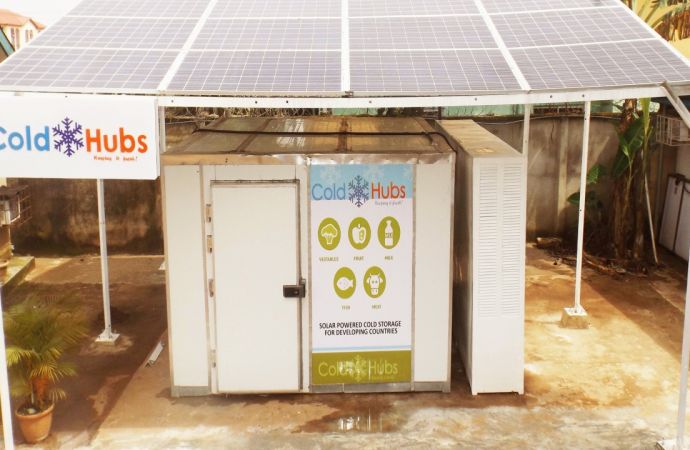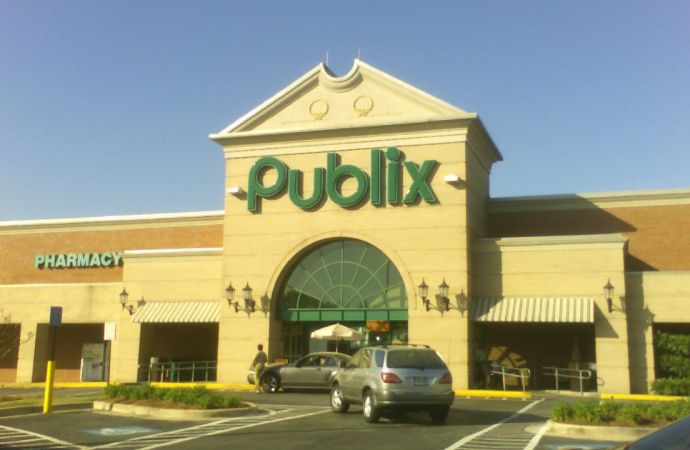Farmers, retailers and wholesalers will rent space at the facilities for perishable food, preventing food waste.

A solar-powered R290-based ColdHubs station in Africa
ColdHubs, a Nigeria-based provider of propane (R290)-based solar-powered cold-storage space for perishable food, plans to expand across Nigeria with 100 new facilities by the end of 2022.
That development was reported by Nnaemeka C. Ikegwuonu, social entrepreneur and founder of six-year-old ColdHubs, during a webinar, “Models for Sustainable Cooling,” organized by Oxford Martin School, a U.K.-based research institute, as part of the Cooling for COP26 series.
ColdHubs’ R290 cold storage systems have helped to reduce food waste and improve living conditions for Nigerian farmers by providing rental space for any kind of perishable food on a per-crate daily basis for smallholder farmers, retailers and wholesalers at 54 pay-as-you-store cold-storage facilities (hubs) across the country.
Ikegwuonu reported that Nigeria has one of the lowest cold-storage capacities in Africa, citing data from the Global Cold Chain Alliance. Current cold-storage facilities in Nigeria, he explained, "are mainly dedicated to fish imports and vaccines." This results in an estimated 45% food-spoilage rate. Ikegwuonu started ColdHubs to "strengthen the Nigerian refrigeration infrastructure for perishable agriculture products," he said.
According to Ikegwuonu, over the course of four years ColdHubs saved 42,024 metric tons of fruit and vegetables from spoilage, increased the incomes of 5,250 farmers, retailers and wholesalers by roughly 50% per month, created 66 jobs for women as facility operators and market attendants and saved 1,040,688kg (2,294,324lbs) of CO2e emissions.
In August 2020, ColdHubs received the Cooling as a Service Award from the Switzerland-based Basel Agency for Sustainable Energy (BASE). CaaS is a pay-for-use arrangement that helps end users pay for cooling projects for which up-front costs would be prohibitive.
Ikegwuonu stressed that education is key to the uptake of this technology. He elaborated on the need to educate technicians on the use of natural refrigerants.
Other initiatives in Africa
Another development in Africa designed to improve the cold chain is the formation of the Africa Centre of Excellence in Sustainable Cooling and Cold-chain (ACES), which will open in 2022 in Kigali, Rwanda.
ACES, funded mainly by public investments from the U.K. and Rwanda, will focus on research and supporting businesses, aiming to position itself as a technology and knowledge hub for sustainable cold chains.
In addition, the European Union is funding a new project, dubbed SophiA (Sustainable Off-grid solutions for Pharmacies and Hospitals In Africa), to develop off-grid, solar-powered cooling systems for hospitals and pharmacies in Africa that use natural refrigerants, including CO2 (R744), propane (R290) and ethane (R170).
Another related initiative is SolarChill, a 21-year-old project that has brought solar-powered vaccine coolers with natural refrigerants (isobutane) to remote, off-the-grid locations. In 2019 it expanded to provide food fridges.
Want to find out more, or have something to say about this story? Join the ATMO Connect network to meet and engage with like-minded stakeholders in the clean cooling and natural refrigerant arena.
Related stories


_1636620968.jpeg)
